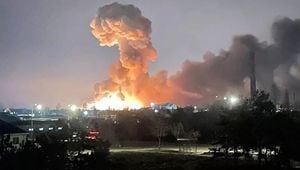At the heart of the COP29 climate summit in Baku, Azerbaijan, controversy is brewing over the access and participation of lobbyists from the fossil fuel sector. Amid ambitious climate discussions and negotiations, multiple reports indicate the presence of thousands of lobbyists, including nearly 500 representatives advocating for carbon capture and storage (CCS) technologies. This situation raises questions about the influence of corporate interests on climate policy and the integrity of the negotiations themselves.
According to DeSmog, the CEO of Centrica, which owns British Gas, has secured access to COP29 under somewhat questionable circumstances. Christopher O’Shea attended as representing the African Centre for Climate Actions and Rural Development Initiative (ACCARD), rather than as the head of his prominent fossil fuel company. This incident is illustrative of broader concerns about fossil fuel lobbyists infiltrate climate negotiations, many of whom attempt to showcase technologies like CCS as pivotal to achieving climate goals.
Notably, over 1,700 fossil fuel lobbyists have been green-lighted to take part at COP29, significantly outnumbering delegates from the nations most afflicted by climate change. Delegates express growing unease, noting how lobbyists engage on panels and possibly sway discussions, often prioritizing industry interests over urgent environmental needs.
Among the notable activities were the private discussions and public statements made during the summit's events. For example, during one session, O’Shea publicly challenged suggestions from Chris Stark of the UK’s clean energy task force about the potential for substantial drops in energy costs through increased green investments. O’Shea stated there is “no evidence” to support claims these shifts would lead to lowered bills, disregarding the broader governmental commitments to decarbonize the energy grid.
O’Shea and Laura Harvey, Centrica's director of public affairs, were issued blue zone passes for COP29, granting them VIP access to key discussions. It was challenging to decipher their motivations for attending the UN summit, as neither provided comment on their presence under ACCARD’s invitation. Such instances have led to questions about ethics, transparency, and the extent to which industry insiders can exploit these forums.
Even more broadly, this year’s summit is shaping up to resemble previous COPs, with many fossil fuel representatives attending under various guises. Reports highlight past incidents where executives from top oil companies cleverly secured their positions at climate conferences, blending their corporate identities with NGOs or other entities, thereby slipping past barriers intended to restrict various interests.
World-renowned anti-fossil fuel activists are not taking this infiltration lightly. Alice Harrison, leading fossil fuel campaigning at Global Witness, aptly likened the presence of fossil fuel lobbyists at climate negotiations to inviting arms dealers to peace talks. She explains, "Fossil fuel lobbyists are invested heavily in maintaining the status quo—keeping dependency on fossil fuel alive and well. Their presence complicates and undermines genuine attempts to mitigate the climate crisis and negatively influences the messages taken back to governmental bodies. The result is not just increased investment and time wasted on fossil fuel infrastructure, but also potential long-term harm to climate action commitments."
Lobbyist figures are staggering, as evident by the registration data collated by watchdog organizations such as the Center for International Environmental Law (CIEL). This year, they have noted unprecedented numbers of lobbyists affiliated with the CCS agenda, with almost half linked as national delegates, which allow them more strategic access to negotiations compared to regular attendees. This access enables them to lobby on high-stakes discussions—where defining rules for climate credits under the Paris Agreement could encourage harmful financing for carbon capture initiatives.
Despite concerns voiced by environmental advocates, there has been discussion at COP29 promoting carbon capture as part of national decarbonisation plans. For example, the UK and UAE have incorporated CCS heavily within their climate strategies, drawing skepticism from activists who challenge the effectiveness and authenticity of such claims. Skeptics argue these technologies can merely serve as cover for continued fossil fuel extraction rather than as legitimate solutions for reducing greenhouse gas emissions.
Detractors of CCS technologies express valid concerns. The Intergovernmental Panel on Climate Change warns against over-relying on such technologies, noting their limited scalability and potential misdirection of funds away from more proven renewable energy options. Some evidence even suggests most existing carbon capture projects have underperformed or failed to live up to the promises made around their climate benefits.



